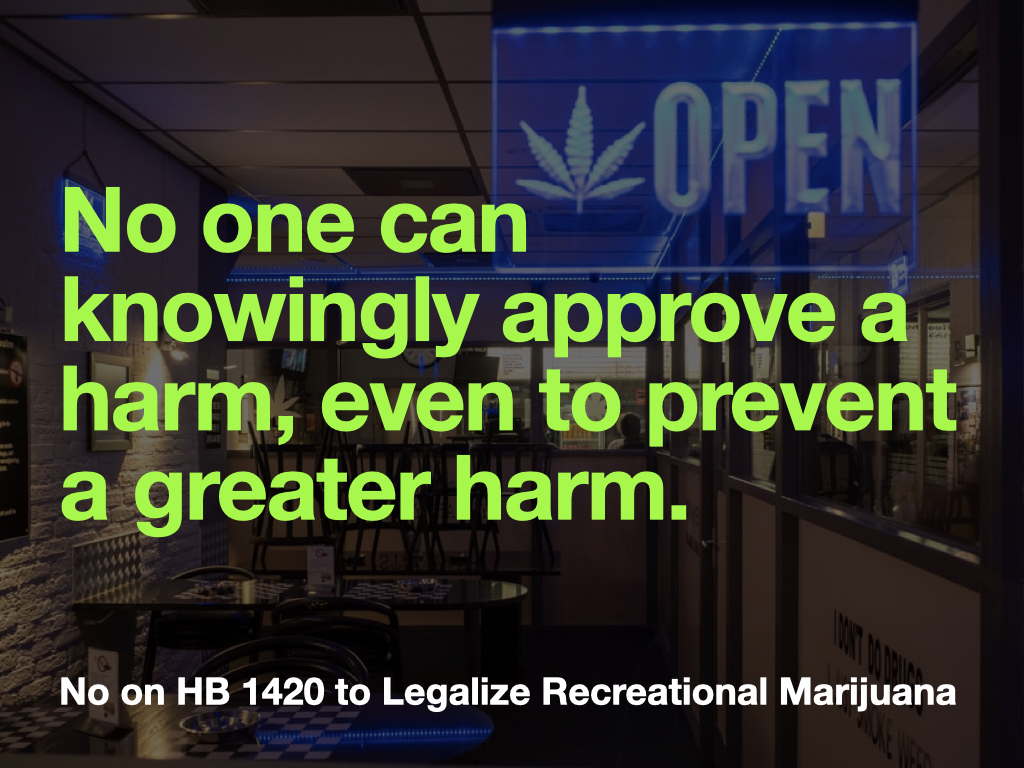
To: Senate Human Services Committee
From: Christopher Dodson, Executive Director
Subject: House Bill 1420 — Legalization of Recreational Marijuana
Date: March 15, 2021
The conference opposes House Bill 1420.
The question before you is not whether HB 1420 is a good legislation if marijuana was legalized. The drafters have, admittedly, done a fine job in that respect. The question before you is not whether this legislation is better than a ballot measure drafted with no legislative input. It probably is. The question before you is whether the state of North Dakota should legalize recreational marijuana.
More specifically, the question before you is whether House Bill 1420 advances the common good in North Dakota or poses a threat to families, children, and the community, especially the most vulnerable. If the answer to this question is the latter, then no amount of claims of inevitability, “better this way than the alternative” arguments, pleas for “personal freedom,” or lobbying by invested interests can justify its passage.
The problems with recreational marijuana are well-documented. States with recreational legalization have the highest teen usage rates.1 When recreational use for adults is legalized, youth increasingly believe that marijuana is not harmful, despite medical evidence that marijuana has a greater negative impact on youth than adults.2 3 Colorado has seen increased addiction and suicide.4 THC, not alcohol, is now the number one drug found in teens who die by suicide in Colorado.5 From 2016 to 2019, the rate of teen suicide in Colorado increased by 58 percent, making it the cause of one in five adolescent deaths.6
Marijuana can contribute to the breakdown of the family. There is substantial evidence that when marijuana use begins before adulthood, drug dependence arises more quickly.7 As these individuals become parents, dependence issues can produce chaotic and stress-filled homes, which harms child well-being.8 Many children have been introduced to the foster care system because they were harmfully exposed to marijuana during pregnancy or childhood, or because they were exposed to dangerous living conditions while their parents were growing marijuana. During pregnancy, emerging evidence suggests “an association between marijuana and fetal growth restriction, stillbirth, and preterm birth.”9
Research shows the negative impact of recreational marijuana use on health outcomes. Regular marijuana use has been connected to respiratory problems; mental health issues (schizophrenia, bipolar disorder, suicidal thoughts, and social anxiety disorder), and learning, memory and attention loss.10 Additionally, marijuana-related hospitalizations, emergency room visits and poison control calls—including for those under age eight—have increased in Colorado since legalization.11
Companies in states with legalized recreational marijuana have struggled to find employees who can pass drug tests, especially for federal jobs, industries that require operation of heavy machinery, or jobs requiring truck driving.12 Research shows employees who tested positive for marijuana in pre-employment drug tests have higher rates of industrial accidents, injuries, and absenteeism.13
Other than strained and ultimately vacuous personal freedom claims, the only argument for House Bill 1420 is that it is better than what may come through a ballot measure. It is very tempting to fall into the inevitability and consequentialist error that it is better to accept something that is wrong or harmful to prevent a presumably greater wrong or harm. Such thinking, however, is always erroneous and always unacceptable. No one, including a legislative body, can knowingly approve a harm, even to prevent a greater harm.
HB 1420 does not advance the common good and poses harms to families, children, our most vulnerable, and the community. Instead, it signals that marijuana is safe, without regard for those families and communities it leaves behind.
We urge a Do Not Pass recommendation on House Bill 1420.
1 Arthur Hughes, MS, Rachel N. Lipari, PhD, and Matthew Williams, PhD, The CBHSQ Report: State Estimates of Adolescent Marijuana Use and Perceptions of Risk of Harm From Marijuana Use: 2013 and 2014, SAMHSA, 12/17/15: https://bit.ly/2wVozVm
2 “Marijuana Legalization in Colorado: Early Findings,” Colorado Department of Public Safety, March 2016, https://bit.ly/1Vecjap
3 “Marijuana Users Have Abnormal Brain Structure and Poor Memory,” Northwestern Now, 12/16/13:
https://bit.ly/2C61S1n
4 https://www.nytimes.com/roomfordebate/2016/04/26/is-marijuana-a-gateway-drug/marijuana-has- proven-to-be-a-gateway-drug
5 https://daily.denvergazette.com/@Reader18982471/csb_GZ2mJA- kAmkaumOqr_KknqQhGR6J71haoDkkE5XIMJ9MxE0z_GpUP7mPJ7ExyfWb
6 https://www.cpr.org/2019/09/17/the-rate-of-teen-suicide-in-colorado-increased-by-58-percent-in-3- years-making-it-the-cause-of-1-in-5-adolescent-deaths/
7 Chuan-Yu Chen, PhD, Carla L. Storr, ScD, and James C. Anthony, PhD, “Early-Onset Drug Use and Risk for Drug Dependence Problems,” March 2009, https://www.ncbi.nlm.nih.gov/pmc/articles/ PMC2677076/
8 “Drugs, Brains, and Behavior: The Science of Addiction,” National Institute on Drug Abuse, updated July 2018: https://bit.ly/2MdbhJB
9 “Marijuana and Child Abuse and Neglect,” Colorado School of Public Health, November 2016: https:// coloradosph.cuanschutz.edu/docs/librariesprovider151/default-document-library/mj-cw-hia-final- report-11-3-2016.pdf
10 “The Health Effects of Cannaabis and Cannabinoids,” The National Academy of Sciences, 2017:
https://bit.ly/2jc3pO3
11 “Marijuana Legalization in Colorado: Early Findings,” Colorado Department of Public Safety, March 2016, https://bit.ly/1Vecjap
12 “Medical Marijuana in the Workplace,” Journal of Occupational and Environmental Medicine, May 2015: https://bit.ly/2BPdP0l
13 “How does marijuana use affect school, work, and social life?” National Institute on Drug Abuse, updated June 2018: https://bit.ly/1oIZI1v
Date: March 15, 2021
The conference opposes House Bill 1420.
The question before you is not whether HB 1420 is a good legislation if marijuana was legalized. The drafters have, admittedly, done a fine job in that respect. The question before you is not whether this legislation is better than a ballot measure drafted with no legislative input. It probably is. The question before you is whether the state of North Dakota should legalize recreational marijuana.
More specifically, the question before you is whether House Bill 1420 advances the common good in North Dakota or poses a threat to families, children, and the community, especially the most vulnerable. If the answer to this question is the latter, then no amount of claims of inevitability, “better this way than the alternative” arguments, pleas for “personal freedom,” or lobbying by invested interests can justify its passage.
The problems with recreational marijuana are well-documented. States with recreational legalization have the highest teen usage rates.1 When recreational use for adults is legalized, youth increasingly believe that marijuana is not harmful, despite medical evidence that marijuana has a greater negative impact on youth than adults.2 3 Colorado has seen increased addiction and suicide.4 THC, not alcohol, is now the number one drug found in teens who die by suicide in Colorado.5 From 2016 to 2019, the rate of teen suicide in Colorado increased by 58 percent, making it the cause of one in five adolescent deaths.6
Marijuana can contribute to the breakdown of the family. There is substantial evidence that when marijuana use begins before adulthood, drug dependence arises more quickly.7 As these individuals become parents, dependence issues can produce chaotic and stress-filled homes, which harms child well-being.8 Many children have been introduced to the foster care system because they were harmfully exposed to marijuana during pregnancy or childhood, or because they were exposed to dangerous living conditions while their parents were growing marijuana. During pregnancy, emerging evidence suggests “an association between marijuana and fetal growth restriction, stillbirth, and preterm birth.”9
Research shows the negative impact of recreational marijuana use on health outcomes. Regular marijuana use has been connected to respiratory problems; mental health issues (schizophrenia, bipolar disorder, suicidal thoughts, and social anxiety disorder), and learning, memory and attention loss.10 Additionally, marijuana-related hospitalizations, emergency room visits and poison control calls—including for those under age eight—have increased in Colorado since legalization.11
Companies in states with legalized recreational marijuana have struggled to find employees who can pass drug tests, especially for federal jobs, industries that require operation of heavy machinery, or jobs requiring truck driving.12 Research shows employees who tested positive for marijuana in pre-employment drug tests have higher rates of industrial accidents, injuries, and absenteeism.13
Other than strained and ultimately vacuous personal freedom claims, the only argument for House Bill 1420 is that it is better than what may come through a ballot measure. It is very tempting to fall into the inevitability and consequentialist error that it is better to accept something that is wrong or harmful to prevent a presumably greater wrong or harm. Such thinking, however, is always erroneous and always unacceptable. No one, including a legislative body, can knowingly approve a harm, even to prevent a greater harm.
HB 1420 does not advance the common good and poses harms to families, children, our most vulnerable, and the community. Instead, it signals that marijuana is safe, without regard for those families and communities it leaves behind.
We urge a Do Not Pass recommendation on House Bill 1420.
1 Arthur Hughes, MS, Rachel N. Lipari, PhD, and Matthew Williams, PhD, The CBHSQ Report: State Estimates of Adolescent Marijuana Use and Perceptions of Risk of Harm From Marijuana Use: 2013 and 2014, SAMHSA, 12/17/15: https://bit.ly/2wVozVm
2 “Marijuana Legalization in Colorado: Early Findings,” Colorado Department of Public Safety, March 2016, https://bit.ly/1Vecjap
3 “Marijuana Users Have Abnormal Brain Structure and Poor Memory,” Northwestern Now, 12/16/13:
https://bit.ly/2C61S1n
4 https://www.nytimes.com/roomfordebate/2016/04/26/is-marijuana-a-gateway-drug/marijuana-has- proven-to-be-a-gateway-drug
5 https://daily.denvergazette.com/@Reader18982471/csb_GZ2mJA- kAmkaumOqr_KknqQhGR6J71haoDkkE5XIMJ9MxE0z_GpUP7mPJ7ExyfWb
6 https://www.cpr.org/2019/09/17/the-rate-of-teen-suicide-in-colorado-increased-by-58-percent-in-3- years-making-it-the-cause-of-1-in-5-adolescent-deaths/
7 Chuan-Yu Chen, PhD, Carla L. Storr, ScD, and James C. Anthony, PhD, “Early-Onset Drug Use and Risk for Drug Dependence Problems,” March 2009, https://www.ncbi.nlm.nih.gov/pmc/articles/ PMC2677076/
8 “Drugs, Brains, and Behavior: The Science of Addiction,” National Institute on Drug Abuse, updated July 2018: https://bit.ly/2MdbhJB
9 “Marijuana and Child Abuse and Neglect,” Colorado School of Public Health, November 2016: https:// coloradosph.cuanschutz.edu/docs/librariesprovider151/default-document-library/mj-cw-hia-final- report-11-3-2016.pdf
10 “The Health Effects of Cannaabis and Cannabinoids,” The National Academy of Sciences, 2017:
https://bit.ly/2jc3pO3
11 “Marijuana Legalization in Colorado: Early Findings,” Colorado Department of Public Safety, March 2016, https://bit.ly/1Vecjap
12 “Medical Marijuana in the Workplace,” Journal of Occupational and Environmental Medicine, May 2015: https://bit.ly/2BPdP0l
13 “How does marijuana use affect school, work, and social life?” National Institute on Drug Abuse, updated June 2018: https://bit.ly/1oIZI1v
What We Do
The North Dakota Catholic Conference acts on behalf of the Roman Catholic bishops of North Dakota to respond to public policy issues of concern to the Catholic Church and to educate Catholics and the general public about Catholic social doctrine.

Contact Us
North Dakota Catholic Conference
103 South Third Street, Suite 10
Bismarck, North Dakota
58501
1-888-419-1237
701-223-2519
Contact Us

